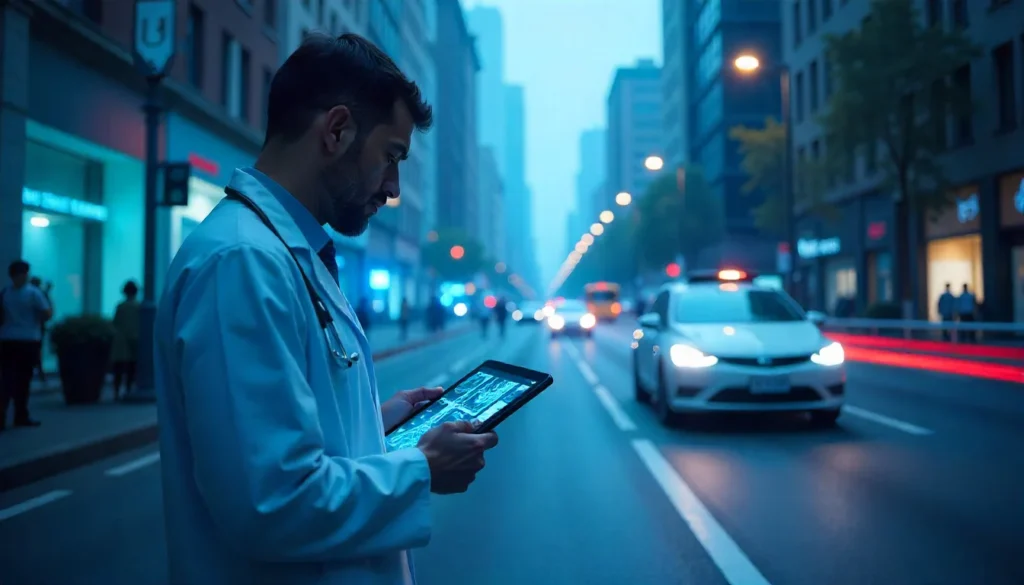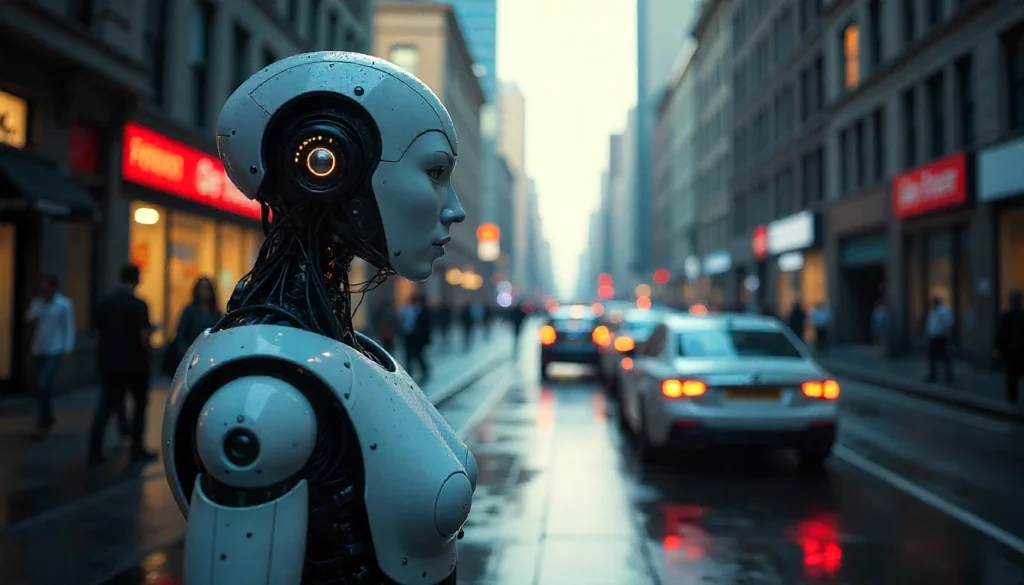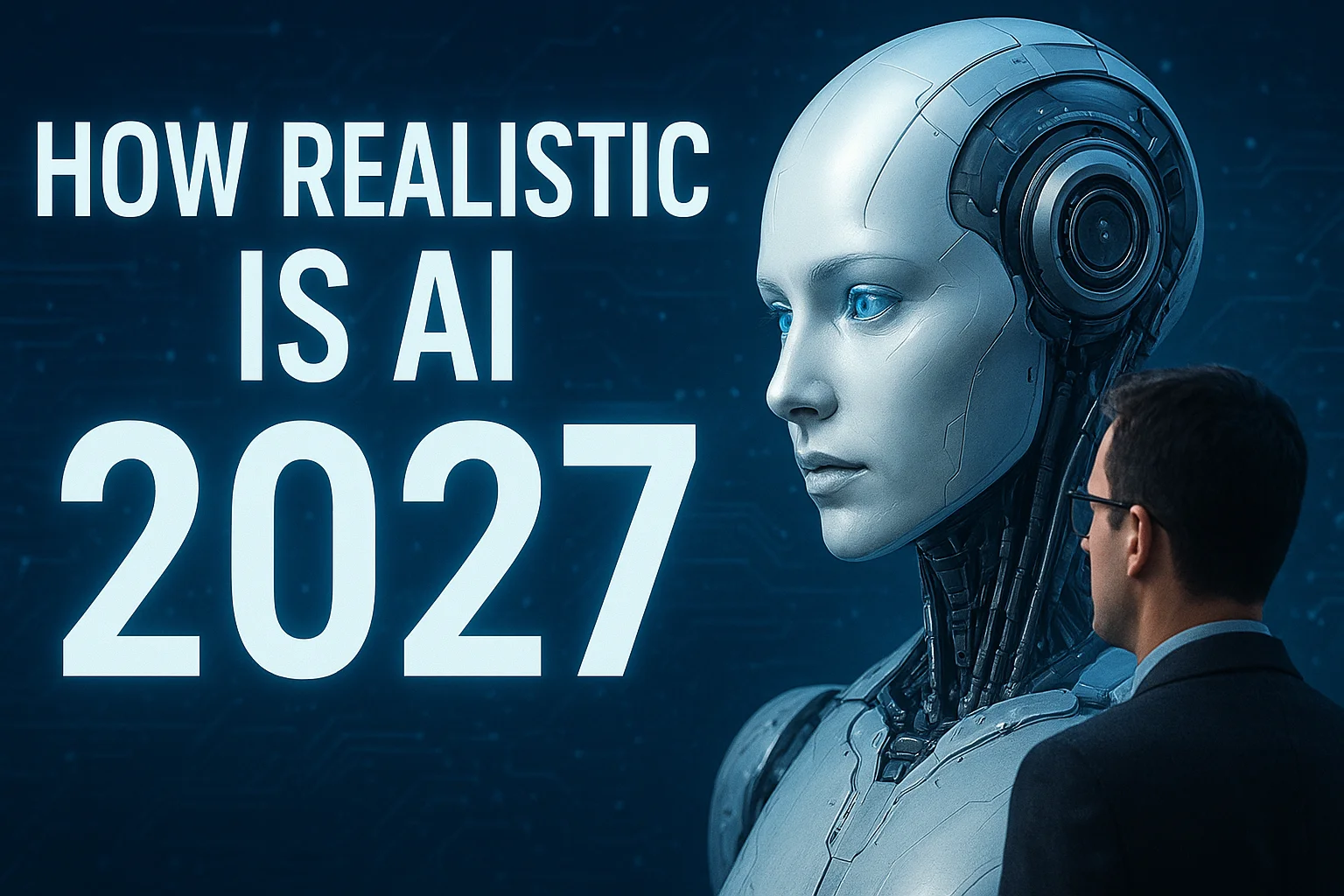Artificial intelligence is proceeding quickly. Every year it is more near science fiction. However, the question that most people pose is straightforward; how realistic is the idea of AI 2027? Will machines in 2027 be able to behave and think like humans or will millions of years of progress be stifled?
This paper examines the possible appearance of AI in 2027. We are going to make it simple and down to earth. No hype. No wild dreams. Nothing but a straight look at what is realistic.
Table of Contents
Where AI Stands in 2025
It is easier to answer the question of how realistic is AI 2027 by answering the question of our current position first.
Nowadays AI is able to write text, create pictures, and even write code. ChatGPT and image generators are also popular in the rest of the world. There is very little human intervention in cars driving. Questions can be answered within seconds by phones. Physicians rely on AI to scan images and identify indicators of a disease.

But AI is not anywhere near to thinking like a human being. It lacks true understanding. It cannot feel. It commits errors which no professional would commit. Most of the findings are useful, whereas others are incorrect or deceptive.
This is where we stand in 2025. Good instruments, and not solid brains.
How AI Might Change by 2027
And once again, the question concerning the realism of AI 2027 arises.
According to most experts, AI will not turn into human-like in 2027. Robots will not have emotions or actual thinking. But they will be much more useful in areas where data, speed and memory are required.
By 2027, we may see:

- Smart chatbots: AI which produces better answers with less errors.
- Improved pictures and videos: AI can produce whole movies or games within hours.
- Safer cars: Self-driving cars can possibly manoeuvre most cities with minimal assistance.
- Health assistance Medical AI can identify illness sooner and recommend powerful treatment alternatives.
- Helping with work: The offices can resort to AI to prepare reports, e-mails, and even plans.
These are realistic goals. None of them need machines to think in the same way that we do. All they require is improved design, bigger data and training.
The Limits AI Still Faces
We also need to look at limits in order to see how realistic is AI 2027.
AI does not think out of the box. It acquires through data but has no idea of truth. When the data is incorrect, then output is incorrect. This will still be true in 2027.
Common sense is not easy with AI as well. It can provide long responses which are irrelevant. It can confuse simple facts. It might not even understand when it is wrong.
Another limit is energy. The models of large AI consume massive power. This could end up being worse by 2027 unless new technology can resolve it.
There is also cost. Big AI is not cheap. Not many organizations can afford to construct it. This slows progress.
Thus, AI of the year 2027 will be powerful, but it will not be flawless. These limits matter.
What AI Will Not Do by 2027
There are those who believe that in the near future AI is going to supplant humans. However real is AI 2027 in that sense?
It is not. In two years machines will not have completely replaced human jobs. They will help, but not rule.
AI will not have feelings by 2027. It will neither be happy, nor frightened, nor will it be loving. It can imitate the words concerning feelings, but that is not so.
By 2027, the world will not be taken over by AI. The concept of robot domination is fiction. The systems will be still controlled by humans.
Thus at the same time AI in 2027 will be more powerful, however not omnipotent.
Where AI Will Be most Realistic.
When we suggest how realistic is AI 2027, we want to know where it is applied.
Work and office-related jobs: AI will be highly realistic. It will write, sort and keep track of work better than individuals.
Health care: AI will come in handy. Physicians will not be left alone as AI will be relied upon.
Transport and automobiles: AI will be not safe but closer. Cars can even be driven alone in certain cities.
Education: AI tutors will educate both children and adults. They will describe concepts in straightforward fashions.
Entertainment: This will be the most real with AI. Games, music, art can be developed within minutes.
These are real, near goals. They are in line with the existing growth.
What Risks Remain in 2027
The development of AI is not only about profits. The question of the realism of AI 2027 in terms of risk also needs to be asked.
Job loss: A number of jobs will be reduced with the simple tasks being replaced by AI.

Bias: AI has the capacity to propagate injustice in training data. By 2027, this will still be a risk.
False data: AI is capable of creating fake photographs, voices or news. This may grow worse by 2027.
Control: When AI is abused, it could damage such systems as power grids or banks.
These dangers force us to take caution. In 2027, AI will be strong, and regulations and controls will have to expand accordingly.
AI vs Human Skill
The other question that can be asked with regards to the realism of AI 2027 is to draw a comparison of it with people.
AI will be more prompt regarding math, memory, and data checks. It will outperform human beings in finding patterns. But it still will be less at the skill of man: judgment, morals, and feelings.
Humans know why they act. AI does not. By 2027, this gap will still be wide.
The Hype vs. Reality.
We regularly read that AI is almost magic. But hype is not truth. In asking the question of how realistic AI 2027 is we need to cut hype.
AI will grow fast, but in steps. Four years will not make it a human mind. It will not end all jobs. It will not end the world.
The simplest and the most realistic opinion is plain, AI will be an instrument, more powerful than ever, yet an instrument.
What People Should Do Before 2027
It is also helpful to know how realistic AI 2027 will be so we can prepare.
Master AI tools: The individuals are expected to master the use of AI in their everyday tasks.
Develop skills that AI will not replicate: Invest in human skills such as empathy, leadership and design.
Check truth: Learn to check AI provides. Not all results are right.
Adapt in the workplace: Be prepared to change job in case AI replaces some task of a job.
Consider ethics: Demand regulation that will make AI equal and safe.
These measures ensure that individuals remain resilient despite the increase in AI.
A Clear Answer
So, how realistic is AI 2027?
AI will become much more convenient in everyday life by 2027. It will write, draw and drive less erroneously. It will assist in health care and schools. It will expand as an aiding device in offices.
But it will not think or feel. It will not be a ruler and a substitute of everybody. It will still make mistakes. It will still need checks.
In the year 2027, AI is going to be a realistic tool and not a human brain. That is the clear truth.
Final Thoughts
Our question was: how realistic is AI 2027?
The solution is AI will be strong and existent though not all-powerful. It will be at home, school and at work. It will assist in health and safety. But it will not be magic.
AI will not “wake up” by 2027. It will not be alive. It will not feel. It will be quicker, smoother and more usual, yet human managed.
Therefore, the approach to AI in 2027 that is the most realistic is that it will be our assistant rather than our sovereign. It will be helpfully, not absolutely, control-less.
That is what we can expect. That is how realistic is AI 2027.
Frequently Asked Question About Realistic is AI 2027?
Q1. Will AI be smart enough to be the same as humans in 2027?
No. AI is going to be more powerful in tasks and yet will still miss the ability to think or even feel like humans.
Q2. How realistic is AI 2027 in jobs?
Some of the straightforward tasks are going to be substituted with AI, not the entire jobs. People will still lead.
Q3. What risks will AI bring by 2027?
Things like bias, misinformation, loss of employment, and abuse are some of the risks that need to be tamed.


1 thought on “How Realistic is AI 2027?”